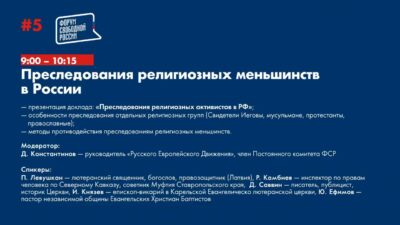Amnesty International has confirmed the withdrawal of its recent designation of Russian opposition politician Aleksei Navalny as a “prisoner of conscience” over his alleged advocacy of violence and discrimination and comments that included hate speech, but reiterated its determination to keep fighting for his release.
“Amnesty International took an internal decision to stop referring to Aleksei Navalny as a prisoner of conscience in relation to comments he made in the past,” Denis Krivosheev, deputy director of Amnesty’s Europe and Central Asia office, confirmed to RFE/RL in an e-mailed response.
“Some of these comments, which Navalny has not publicly denounced, reach the threshold of advocacy of hatred, and this is at odds with Amnesty’s definition of a prisoner of conscience,” Krivosheev said, adding that Navalny “has not publicly denounced” his past comments.
Amnesty also noted that “Navalny has not, to the best of our knowledge, made similar pronouncements in recent years.”
Krivosheev said that Amnesty’s decision “does not change our resolve to fight for his immediate release, and for an end to his politically motivated persecution by the Russian authorities.”
Krivosheev added that Navalny, whom the group named a prisoner of conscience after his arrest in Moscow last month, “has committed no crime” and that in spite of its decision regarding his status as a prisoner of conscience, “Amnesty delivered 200,000 signatures to the Russian authorities demanding Navalny’s immediate release.”
Navalny “is imprisoned solely for his peaceful anti-corruption research and campaigning, his political activism and his criticism of Putin’s government. Our campaign to end the grave injustice done to Navalny and so many others in Russia continues,” Amnesty concluded.
The rights group’s decision was first reported by U.S. journalist Aaron Mate on February 23 and was confirmed to Mediazona by Aleksandr Artemyev, the rights watchdog’s media manager for Russia and Eurasia.
Artemyev wrote that Amnesty, which named Navalny a prisoner of conscience after his arrest in Moscow in January, decided to retract the designation “in light of new information” stemming from “old videos and social-media posts in which Navalny made controversial pronouncements.”
The comments attributed to Navalny in the mid-2000s were not specified, but Artemyev said they were made as Navalny’s activism and challenge to Russian President Vladimir Putin were gaining momentum and that their reemergence “appears to be another tactic to delegitimize Navalny’s work and criticism and to weaken public outcry about his detention.”
The 44-year-old Navalny was arrested at Moscow’s Sheremetyevo airport after he arrived on January 17 from Berlin, where he had been recovering from a poisoning with a Soviet-era nerve agent in August 2020 that Navalny says was ordered by Putin and carried out by Russian intelligence.
Protests
Navalny’s arrest for failing to report to the Moscow prison service — a violation of a suspended sentence related to a 2014 conviction for embezzlement that he and critics say was politically motivated — sparked anti-government protests in hundreds of cities and led to thousands of arrests.
On February 2, Navalny’s 3 1/2-year suspended sentence was converted to real jail time. His appeal was rejected on February 20, ensuring that Putin’s biggest political rival will spend about 2 1/2 years in prison, considering time already spent in detention.
In a separate case heard the same day, Navalny was fined 850,000 rubles ($11,500) on charges of slandering a World War II veteran who had participated in a Kremlin-organized promotional video.
After Amnesty recognized Navalny as a prisoner of conscience on January 17, saying his arrest was “further evidence that Russian authorities are seeking to silence him,” the rights watchdog reportedly began receiving letters of complaint from unknown sources.
Navalny’s anti-corruption organization has targeted many high-profile Russians, including high-ranking government officials.
In the course of his political career, Navalny has also come under criticism for his association with ethnic Russian nationalists and about statements seen as racist and dangerously inflammatory.




